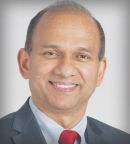April is the cruelest month, breeding
Lilacs out of the dead land, mixing
Memory and desire, stirring
Dull roots with spring rain.
Winter kept us warm, covering
Earth in forgetful snow, feeding
A little life with dried tubers.
—T.S. Eliot, The Burial of the Dead, The Waste Land, 1922
I started hating the month of April on April 27, 2002. That was the last time I gave CPR and mouth-to-mouth under a flickering light in a village in Kerala, India. The pouring monsoon rain and the darkness outside witnessed the tragedy that was unfolding in the small clinic. There was no ECG machine or glucometer, and, of course, a defibrillator was unheard of. I was a highly trained doctor who had worked at some of the best hospitals in the world, including the National Institutes of Health and the National Naval Medical Center in Washington, DC.
That April night was when my father, 61 years old, died in my hands from a cardiac arrest. That was the night I felt beyond helpless. Even after 18 years, not a single day passes by without my thinking about my Achachan (father), who made me who I am today. I can still feel that chilling helplessness in my spine.
Feeling Helpless Again

Jame Abraham, MD, FACP
While the world faces the tsunami of the COVID-19 pandemic this April, I’m overcome with those same feelings. When I watch the health-care workers, who are highly trained and working at some of the best hospitals in the world, I can understand their helplessness.
Many parts of the United States, including my home of Cleveland, are bracing for a cruel April. About 15% to 20% of people infected with the coronavirus in the Western world are health-care workers. From Milan to New York, doctors, nurses, and other health-care workers are dying alone in intensive care units among thousands of patients.
I talked to my two boys and my wife about how they should manage if I die in this pandemic. I talked about supporting each other and always loving each other. This is a time of extreme vulnerability. I am sure similar conversations are happening around the dining room table in many households, especially those of health-care workers. Not just in my house.
Changes for Health Care Ahead
This pandemic will change our world and health care forever. Our lives will not be the same. Hopefully, Western governments will start investing in public health and prioritize public policies to protect our communities from another pandemic in the future. We will find meaning by banding together as a global community, not by working in isolation. This is a humanitarian tragedy, not a problem for just China or Italy.
The way we connect with our patients, colleagues, and the larger society will be changed forever. As caregivers, we will get comfortable with distance health; doctor/patient relationships will find comfort in a new virtual reality. We will question the limited value of a physical exam for a patient who just had a PET scan, MRI, and blood tests. We will question why a patient has to drive 3 hours, park the car, and wait in line for a 30-minute visit. We will question the need for in-person meetings and large conferences. Hopefully, medical education will place more importance on epidemiology, public health, prevention, and public policies.
That said, however, the connection and trust felt from virtual hugs with thankful patients with cancer are nowhere close to real hugs.
Renewed Sense of Purpose and Clarity
Most significantly, however, this pandemic is bringing out the best of our profession—doctors, nurses, other caregivers, and administrators. It is giving us a renewed sense of purpose and clarity. We are here to help our patients, no matter what.
I have never been more proud of my colleagues at Cleveland Clinic and health-care workers around the world. The entire medical community is pulling together, and I feel privileged to be part of it. The kindness, compassion, and selflessness are truly inspiring. As an eternal optimist, I strongly believe in our resilience. We will come out stronger on the other side of this pandemic.
DISCLOSURE: Dr. Abraham has received institutional research funding from Seattle Genetics, Pfizer, Daiichi Sankyo, and Merck, but reports no personal financial conflicts of interest.
Dr. Abraham is Chairman of the Department of Hematology and Medical Oncology at Taussig Cancer Institute and Professor of Medicine at the Cleveland Clinic Lerner College of Medicine.

